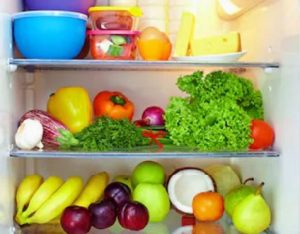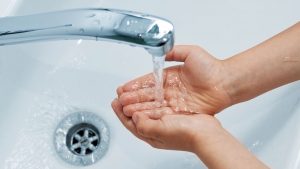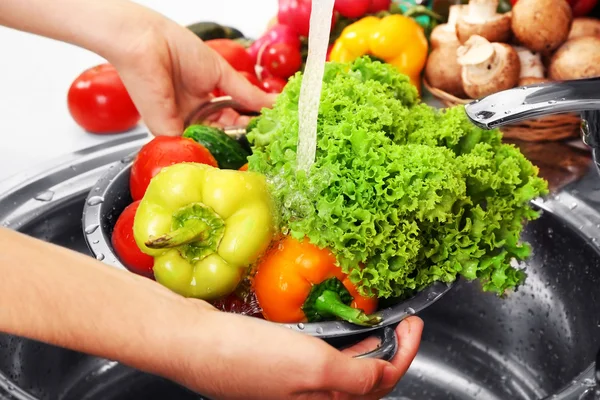Today, almost 50 million people experience food poisoning every year. Food poisoning is often caused by contaminated food. Studies show that very few people observe hygienic practices when handling food.
In particular, raw fruits and vegetables need thorough washing to prevent contamination. Even so, with the COVID-19 pandemic, the majority of homeowners now wonder whether plain water is effective for disinfecting vegetables.
No products found.
In this article, we look at some of the best techniques on how to wash vegetables.
The risk with veggies is that fresh produce can get contaminated in lots of ways like:
- By farm animals
- By water or soil during growth
- By food employees when harvested
- When being transported
- By grocery store employees
- By food surfaces used to prepare food
Detailed steps involved in washing vegetables
There is a broad spectrum of ways in which vegetables can get contaminated. Remember, these are fresh produce. Thus, they can get contaminated while at the grocery store or during transportation.
Also, vegetables can get contaminated due to poor storage practices. Thus, before you consume or cook any vegetables, it is important to wash them.
- The first step when you plan to cook or eat fresh vegetables would be to rinse them in running water. You can do this before you get rid of the peels. Consequently, you prevent any microorganisms from settling on the knife.
- After peeling the vegetable, rinse it again under running water. Using detergent or disinfectant chemicals can be harmful to your health. So, it would be best if you used pure water. You can use a colander to help in draining water as you wash the vegetables.
- Then, you can go ahead and prepare your vegetable or store it in the refrigerator. If you are storing vegetables in the refrigerator, store them in very low temperatures and do not leave them for more than three days. Otherwise, it will become rancid.

Some vegetables like cucumber will need a gentle scrub. So, make sure you buy the right vegetable brush that can help you clean your vegetables.
If you are cleaning a cabbage or lettuce, get rid of the outer leaves since they tend to carry dirt. Ensure that you properly clean your hands before and after handling any vegetable.
Also, when cleaning vegetables, ensure you eliminate all the areas that show signs of spoiling.
Why should I wash my vegetables?
Washing your vegetables before eating them goes a long way in boosting your health. Often, raw vegetables harbor different kinds of microorganisms. These can cause food poisoning or bacterial infections in humans.
Keep in mind that you are not the only one who has handled the vegetables you plan on buying. From the time they were ripe, vegetables have passed through the hands of different people.
Also, while on the store display, potential buyers could have touched them. So, always wash your vegetables before consuming them.
What is the most recommended way of washing my vegetables?
At present, some homeowners use detergent and sanitizing agents to clean their vegetables. But is this safe? As much you may think soap or disinfectant will provide extra cleaning for your vegetables, it is not recommendable. Detergents and soaps contain chemicals that can pose a danger to your health when ingested.
Additionally, bleach and vinegar are also not the best agents for washing your vegetables, partly because they can leave an aftertaste. The best way to wash your vegetables is to by using clean water.
Ultimately, do not contaminate your vegetables with chemical cleaning agents. Some chemicals like bleach can cause serious health issues that can lead to death.
However, there is no harm in using vinegar to wash vegetables besides the mild taste. Mix 1 part of vinegar in 3 parts of water to wash your vegetables and fruits, though it may be unnecessary to use vinegar to clean vegetables. This is because a good clean with water will get rid of most of the bacteria.
Cleaning leafy greens
The process of washing your vegetables will vary slightly depending on the type of vegetable. For instance, if you have greens like kale, spinach, and cabbage, the first thing to do would be to get rid of the outermost layer.
Often, the outer layer contains soil, among other forms of dirt. So, it is not safe for consumption. You’d rather throw it away. After peeling the exterior part of leafy greens:
- Insert the vegetable in clean water and let it sit for about thirty seconds.
- Twirl it around the water and rinse it again under a running tap.
- Ensure that the leafy greens are thoroughly clean before you proceed to cook them.
Delicate farm produce
Usually, some vegetables are more delicate than others. An example of such a vegetable is mushroom. With these kinds of vegetables, it would be best if you applied minimal pressure when cleaning them. So, gently allow running water at low pressure to cascade down the vegetable.
Moreover, when holding it, don’t exert too much force. Otherwise, you would distort its composition. Once you finish rinsing delicate vegetables, it would be best if you lay them out on a paper towel to dry. After drying, you can proceed with cooking your mushrooms.
Wash vegetables immediately before consumption
It is always advisable to wash your vegetables just before preparing them. Washing your vegetables before storage can lead to contamination. Remember, bacteria thrive well under moist conditions.
So, when you wash your vegetables and leave them for some days, they are likely to rot much faster. If you are not planning to consume your vegetables immediately after purchase, store them under low temperature first. Then, wash them right before preparing them.
Always wash your hands before handling vegetables

Today, washing and sanitizing our hands is part and parcel of our daily lives. Thanks to the COVID-19 pandemic.
Before handling any vegetable, wash and/or sanitize your hands. This way, you begin handling the vegetable on a clean slate. And this applies to all food items. Also, after thoroughly washing the vegetable, wash your hands.
Follow the correct procedure of washing your hands. Otherwise, you might contaminate your food with bacteria or viruses that can pose a danger to your health.
Tips on how to wash vegetables:
Washing in batches:
Rather than washing veggies as and when needed, it is best to regularly wash them immediately after getting the vegetables home from the grocery outlet. Washing in batches can help you save your time and water.
For green veggies, it is best to wash them; use a salad spinner to dry them and store the vegetables in the fridge.
Cooking rather than raw:
For the next couple of weeks, it might be best to cook everything before eating. Cooking will eliminate any contamination and bacteria.
Using cold water:
This is the best way to wash the produce. It will help keep everything crisp and fresh. The only thing you should not wash is onions and garlic. Their thin papery skin won’t withstand moisture, and these vegetables that often last longer can spoil quickly. However, because you peel these vegetables anyway before you use them, they will be all right.
Conclusion
Vegetables are nutritious, and most homeowners incorporate them in most of their meals. However, it is essential to wash vegetables before you consume them. Otherwise, you would pose a danger to your health.
Currently, there are thousands of food contamination cases worldwide. And with the COVID-19 pandemic, we have to observe proper hygiene when it comes to preparing meals. As a result, kitchen experts always recommend washing your vegetables using the right techniques.
Often, plain water is enough for washing vegetables. All you have to do is pass a stream of water down your vegetables until they are clean.
Contrary to popular belief, it is not safe to use chemicals like soaps and disinfectants to clean your vegetables. Doing this only increases the risk of food poisoning.
Ultimately, when it comes to washing your vegetables, it is best to use plain water and a vegetable brush where necessary.

